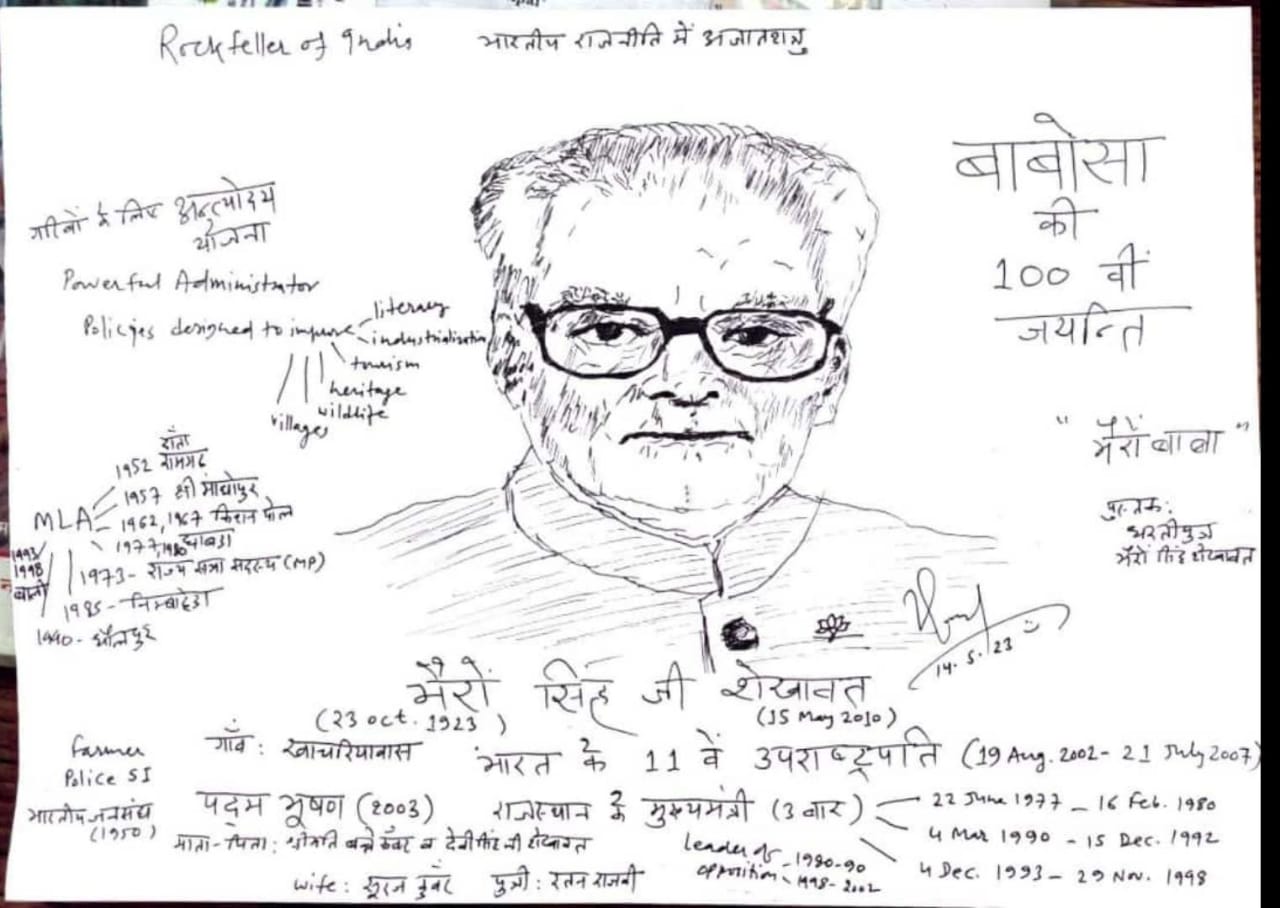Celebrating the Birth Centenary of Bhairon Singh Shekhawat
: A Stalwart Leader from Rajasthan*

In a momentous celebration of a remarkable political journey, Rajasthan honors the birth centenary of Bhairon Singh Shekhawat. Hailing from the humble village of Khachariyawas in the former princely state of Jaipur, Shekhawat's life story stands as a testament to resilience, determination, and the enduring spirit of public service.
**Early Struggles and Unwavering Commitment to Education**
Born into modest surroundings to Shri Devi Singh Shekhawat and Mrs. Banne Kanwar, Shekhawat's formative years were marked by challenges that would have deterred many. His journey into the world of knowledge commenced in the confines of a village school, where he first grasped the fundamentals of the alphabet. However, his thirst for education drove him to traverse thirty kilometers on foot to attend high school in Jobner. A defining moment arose when, upon the untimely demise of his father, Shekhawat found himself bearing the responsibility of supporting his family. In the face of adversity, he not only pursued his education but also embarked on a journey that would ultimately shape the political landscape of Rajasthan.
**A Political Odyssey Rooted in Tenacity**
Bhairon Singh Shekhawat's entry into the world of politics was marked by tenacity and an unshakable commitment to the well-being of his community. Initially, he entered the realm of public service as a sub-inspector in the police force. However, his political journey officially began in the 1952 elections when he accepted a Jan Sangh ticket to contest. An extraordinary anecdote from that period recounts how he embarked on his political voyage armed with a mere Rs. 10 note from his wife's support, securing victory in that historic election and laying the foundation for an illustrious political career.
In the years that followed, Shekhawat's political trajectory was nothing short of remarkable. In 1977, he made history by becoming the Chief Minister of Rajasthan. What made this accomplishment even more extraordinary was that he hadn't been an elected Member of the Legislative Assembly (MLA) at the time. His tenure marked a turning point in the state's political landscape, as he became the first non-Congress Chief Minister of Rajasthan, a testament to his leadership and vision.
Shekhawat's political journey continued to soar as he aligned himself with the Bharatiya Janata Party (BJP) in 1980, leading to his reappointment as Chief Minister. In 1989, a successful alliance between the BJP and Janata Dal reinforced his position as the Chief Minister of Rajasthan. In 2002, he ascended to the prestigious position of Vice President of India, garnering widespread acclaim for his visionary leadership and his unwavering commitment to public service.
**A Legacy of Development and Social Welfare**
Bhairon Singh Shekhawat's tenure as Chief Minister was characterized by a deep-seated commitment to the welfare of the people of Rajasthan. He championed causes such as education, the empowerment of women, and the upliftment of marginalized communities. His visionary leadership extended to the economic development of Rajasthan, as he introduced pioneering policies that fostered industries, mining, road infrastructure, and tourism. His innovative initiatives, including the promotion of heritage hotels and rural tourism, catalyzed the growth of Rajasthan's tourism sector, leaving an indelible mark on the state's economic landscape.
A defining aspect of his leadership was his unwavering commitment to the underprivileged. He initiated the "Antyodaya Anna Yojana," a program designed to provide food to the most underprivileged citizens of the nation. His efforts were so monumental that the then World Bank President, Robert McConmara, likened him to the Rockefeller of India, underscoring the international recognition of his achievements.
**A Lasting Impact and Enduring Schemes**
Even after his passing in 2010, Bhairon Singh Shekhawat's legacy continues to leave an indelible mark on the political and social landscape of Rajasthan and India as a whole. His welfare schemes, including 'Food for Work,' 'Antyodaya,' 'Bhamashah,' and 'Adult Education,' have remained instrumental in uplifting the lives of the underprivileged and empowering the marginalized.
Today, the visionary blueprint Shekhawat had for rural India is gradually becoming a reality. His 'Food for Work' program, in particular, stands as a testament to his commitment to improving the lives of those less fortunate.
**Honors and Recognitions as a Testimony to Excellence**
Bhairon Singh Shekhawat received numerous accolades and honors during his lifetime. These include D.Litt degrees from prestigious institutions such as Andhra University, Visakhapatnam, Mahatma Gandhi Kashi Vidyapeeth, Varanasi, and Mohanlal Sukhadia University, Udaipur. He was also honored with the title of Fellow by the Asiatic Society of Mumbai and received a Doctor of Medicine degree with a Gold Medal from the Yerevan State Medical University in Armenia. Notably, he was bestowed with the Padma Bhushan, India's third-highest civilian award.
**A Leader Remembered for Generations**
Bhairon Singh Shekhawat's contribution to politics, social development, and economic growth remains a celebrated chapter in the annals of Indian history. His vision, dedication, and commitment have left an indelible mark on the landscape of Rajasthan and India as a whole. Affectionately referred to as the "tallest leader of India" by former Prime Minister Manmohan Singh, Bhairon Singh Shekhawat's legacy continues to inspire generations of leaders and citizens alike, reminding us of the enduring power of dedicated public service and visionary leadership.
साभार :
© CopyRight Pressnote.in | A Avid Web Solutions Venture.






